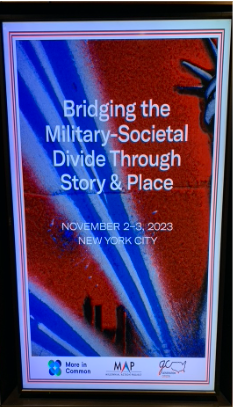by Sharnice Neale-Ottley & Jaritza Geigel
This Veteran’s Day, at Generation Citizen, we are reflecting more deeply on fostering a sense of belonging and civic engagement for veterans, military families, and the communities across the nation where they reside. Generation Citizen (GC) recently collaborated with New Pluralists Field Builders More in Common, Future Caucus, David French, and dozens of cross-sector leaders to host an event that explored ways to foster stronger connections and understanding between military and civilian communities.
During our discussion on building stronger relationships at the community level, participants delved into strategies and initiatives aimed at identifying how to build stronger relationships in local communities – promoting a sense of belonging for veterans and military families within the broader community context. Generation Citizen CEO Elizabeth Clay Roy led and moderated this segment, while GC Program Manager Destiny Warrior served as one of the panelists, sharing her experience as a teacher in Oklahoma. They helped facilitate discussions about hands-on civics education and community-welcoming programming, which can serve as effective tools for community integration.
“What a joy to participate in a panel on Bridging the Military-Civilian Divide Through Story & Place with Destiny,” says Clay Roy, “and to talk about the power of civics education to promote belonging for all students, including those in military families. For many students in military families who make frequent moves, engagement in project-based civics enables them to feel a sense of belonging and agency in their communities and build deeper bonds with classmates.”
At Generation Citizen, our team is involved in a partnership with the Educational Development Center to write a civics-based curriculum for military and military-connected schools. The DoD project grant was entitled SRVCE, which stands for Supporting Readiness through Vital Civic Empowerment. This curriculum contained five modules with 15 lessons in each module. After a successful pilot in 15 states, the SRVCE open-source curriculum is ready for distribution. If you would like to learn more, please view this video introduction to SRVCE and check out the SRVCE website to explore the curriculum.
